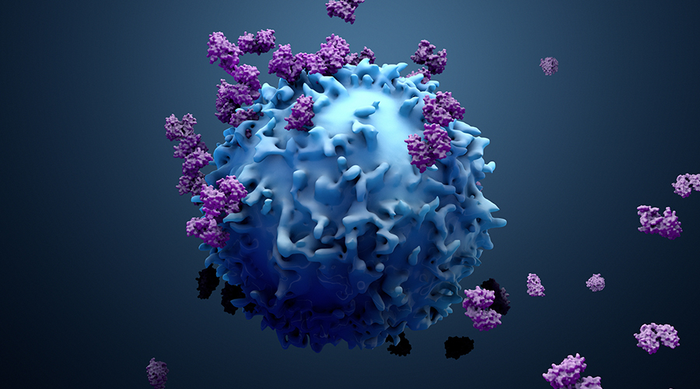Many cancer treatments are notoriously savage on the body; they attack healthy cells at the same time as tumor cells, causing a plethora of side effects. Now, researchers at the University of Chicago’s Pritzker School of Molecular Engineering (PME) have designed a method to keep one promising cancer drug from wreaking such havoc. The team has engineered a new “masked” version of the immunotherapy drug interleukin-12 that is activated only when it reaches a tumor. The research on the molecule, also known as IL-12, is described in the journal Nature Biomedical Engineering.

Credit: Photo copyright istockphoto
Many cancer treatments are notoriously savage on the body; they attack healthy cells at the same time as tumor cells, causing a plethora of side effects. Now, researchers at the University of Chicago’s Pritzker School of Molecular Engineering (PME) have designed a method to keep one promising cancer drug from wreaking such havoc. The team has engineered a new “masked” version of the immunotherapy drug interleukin-12 that is activated only when it reaches a tumor. The research on the molecule, also known as IL-12, is described in the journal Nature Biomedical Engineering.
“Our research shows that this masked version of IL-12 is much safer for the body, but it possesses the same anti-tumor efficacy as the original,” said Aslan Mansurov, a postdoctoral research fellow and first author of the new paper. He carried out the IL-12 engineering work with Jeffrey Hubbell, the Eugene Bell Professor in Tissue Engineering, who co-leads PME’s Immunoengineering research theme with professor Melody Swartz.
Overcoming Toxicity
Researchers know that IL-12 potently activates lymphocytes, immune cells with the potential to destroy tumor cells. But, in the 1990s, early clinical trials of IL-12 were halted because of severe, toxic side effects in patients. The same immune activation that started a cascade of events killing cancer cells also led to severe inflammation throughout the body. IL-12, at least in its natural form, was shelved.
But Mansurov, Hubbell, Swartz and colleagues had an idea to reinvigorate the possibility of IL-12. What if the drug could slip through the body without activating the immune system? They designed a “masked” molecule with a cap covering the section of IL-12 which normally binds immune cells. The cap can be removed only by tumor-associated proteases, a set of molecular scissors found in the vicinity of tumors to help them degrade surrounding healthy tissue. When the proteases chop off the cap, the IL-12 becomes active, able to spur an immune response against the tumor.
“The masked IL-12 is largely inactive everywhere in the body except at the site of the tumor, where these proteases can cleave off the mask,” explained Mansurov.
Taking off the mask
The researchers carried out a series of experiments showing that the masked molecule did not cause the inflammation attributed to the unmodified IL-12. In fact, when they tested the effect of the engineered IL-12 in colon cancer, they found that the drug led to the complete elimination of the cancer cells. In models of breast cancer studied in the lab, masked IL-12 was even more effective than anti-PD1 antibody, an immune therapy commonly used in humans.
To further explore the potential utility of the new drug in treating humans, Mansurov and his colleagues turned to melanoma and breast cancer biopsies collected and donated from patients. The team wanted to ensure that human cancers contained high enough levels of tumor-associated proteases to unmask the IL-12. Indeed, when the engineered IL-12 was exposed to the biopsy samples, its molecular mask came off, unleashing its full immune power.
“For decades, the field has hoped that IL-12 could someday become a viable therapeutic in the fight against cancer and we’ve now shown that it is possible,” said Mansurov. “We’d like to translate this molecule to the clinic and are now talking to a number of potential partners to make that happen.”
While it will take some time to bring this new development to patients, the new treatment is clearly on the horizon.
“Our goal at the Pritzker School of Molecular Engineering is to provide solutions to some of humanities biggest challenges. Immunoengineering takes an interdisciplinary approach to research, which allows us to develop novel methods to fight disease,” said Hubbell. “This is a very promising development for those fighting cancer.”
###
Journal
Nature Biomedical Engineering
DOI
10.1038/s41551-022-00888-0
Article Title
“Masked” cancer drug sneaks through body to deliver anti-tumor treatment with fewer side effects




